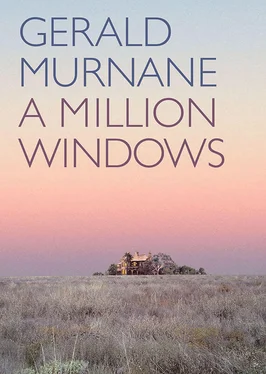
On most evenings, a few of us spend an hour or more in the common room that serves this corridor. The room itself is a dreary space, hardly better furnished than the so-called commercial room that was provided in some of the two-storey hotels in country towns long ago, when numerous commercial travellers or sales representatives drove in their station wagons on the roads of the state where are set, so to speak, many sections of this work of fiction and needed, of an evening, a table or a desk-top where they could do what they called their paper-work while they drank their beer. The only books on the few shelves are so-called reference books: dictionaries, atlases, and those books that pronounce on correct usage of words, correct spelling of difficult proper nouns, and the like. The remainder of the shelves contain hundreds of back numbers of a soft-covered monthly publication, The Australian Journal . The earliest numbers date from the early 1930s while the most recent are from the late 1950s, when the Journal , so to call it, ceased publication after its former readers had taken to watching television during all of their leisure time. The man who deposited this publication on our shelves is almost the only one of us who looks into the back numbers. He has told us often that the collection had been amassed by his parents. They had bought and read the Journal from the first year of their marriage. As soon as he had learned to read, he had looked into whatever number was lying about the house and had tried to make sense of the text. As he grew older, he fell into the habit of reading every one of the dozen and more pieces of short fiction or short stories, as they were called, in every issue. He is aware, so he has often told us, that most of us dismiss those pieces or stories as popular fiction of no deep meaning or lasting worth, but he claims to have learned from the pieces or stories what he calls the power of straightforward narrative.
This same man told some of us one evening in the common room that he still recalled, sixty and more years afterwards, certain series of narrated events from some of the earliest numbers he had read of The Australian Journal , by which he meant not only the scenes that had appeared in his mind while he first read but some of the words of the narrative. Even when he examined what remained to him of books that might be called works of literature, the last traces, as he called them, nearly always comprised a narrative, however brief. He gave as an example an autobiography that he had read nearly thirty years before and had not looked into since. The author had flourished, as the old expression used to have it, in the mid-twentieth century as a paleontologist at several universities in the USA. The man had had a humble and a troubled upbringing. There was much difficulty between him and his mother, which resulted in his leaving home when he was a young man, hardly more than a boy, and having to live as a hobo for some years during the early 1930s. During one of those years, he had been camped alone at evening on a hillside near a railway line. He had lit a campfire and was cooking a simple meal. He understood that a freight train would pass close to the campsite later in the evening, and he intended to jump aboard the train when it was slowed by the hill. When his meal was almost ready, a dog came up to him. The dog appeared to be starving, and the man gave it a portion of his meal. After he and the dog had eaten, the dog rested beside the man as though he and it were now master and faithful servant, and the man speculated that he might have been the first person ever to have fed the dog or to have treated it less than harshly. As the time approached for the arrival of the freight train, the man stood beside the railway line with his pack on his back, and the dog stood close behind him. The man understood that he could not take the dog with him. Not only could he not succeed in getting both himself and the dog aboard the freight train, but he could not live the life of a hobo with a dog to provide for. When he heard the train approaching, the man stood ready to jump aboard. The hill where he stood was well-known among hoboes as a place for jumping aboard, and the man expected some of the hoboes already on the train to have opened some of the doors of the freight vans for someone such as himself. The train slowed; the man saw an open door; the man ran beside the train; the man clambered aboard. As soon as he was securely aboard, the man looked for the dog. He saw it keeping pace with the train and looking up at him. The dog was able to keep pace with the train for as long as it climbed the low hill, but when the train passed the hill, the dog began to fall behind. The man lay in the doorway of the freight van and watched the dog falling further behind. The man later wrote in his autobiography that he had recalled often during the remainder of his life his sight of the dog while it tried to keep pace with the train. He had recalled in particular his sight of the nearer eye of the dog while it tried to keep pace. The eye had seemed to be turned sideways and upwards, or so he had thought, as though the dog had struggled, before it lost sight for ever of the only person who had fed it or had treated it less than harshly, to fix in mind an image of that person.
While the man had been telling us in the common room what is reported above, one among us was seen to stop his ears with his fingers. Most of us surely knew that the man with his fingers to his ears believed himself to be following the example of Henry James, who is mentioned surprisingly often in our part of this building, in not wanting to hear to its end an anecdote that might later provide him with matter for fiction, and I was not surprised when there began in the room one of those inconclusive discussions that some of us seem to enjoy. I heard little of what went forward in the bare, harshly lit room. I was recalling a morning when I was in my twenty-first year and was preparing to move out of my parents’ home. There was much difficulty between me and my mother at the time. Every Sunday morning, I would leave the house as though to walk to our parish church but would call instead at a milk-bar and would sit for an hour at a table inside, sipping a malted milk and reading from the pages of the Sporting Globe the results of horse-races contested on the previous day in every state of the country before returning home as though I had been to church. On one such morning, which I remember as having been cold and overcast, I happened to look at two children in the front yard of one of the many newly built weatherboard houses in the outer suburb where I then lived. The front yard had not yet been turned into any sort of garden. Between the front porch and the front fence were tussocks of grass, clods of earth, and puddles of rainwater. I supposed that the young man and his wife who had recently bought the house had as yet no money to pay for paths or lawn-seed or garden-plants. The two children that I happened to look at were a girl and a boy. The girl may have been six or seven years of age; the boy was a little younger. They were playing the game that many children have surely played: one of the two was a pretend-horse and was steered by the other with a string or a cord. I cannot even recall which child was horse and which was driver. Nor can I recall any detail of the appearance of the boy. I recall only the girl and only the sight of her face when she looked towards me during the first moments after she had become aware that I was passing her house and that I had noticed her and her brother playing among the clods and the tussocks and the puddles. I seemed to learn from her face that she was kindly disposed towards me; that she might have trusted me if ever she had been obliged to do so; that if our circumstances had been vastly different she would have welcomed me into her game. And while the men around me in the common-room went on with their debate as to the worth of anecdotes, I supposed that my eyes must have been turned sideways and downwards while I had passed the front yard where the children were playing, as though I had wanted to fix in mind an image of the first female-person who might have invited me into her pretend-world.
Читать дальше










